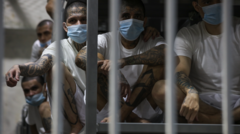In an unprecedented move, El Salvador's leader Nayib Bukele has suggested repatriating 252 Venezuelan deportees held in El Salvador’s jails in exchange for the release of an equal number of political prisoners imprisoned in Venezuela, drawing ire from Maduro's government and human rights activists.
**El Salvador Proposes Prisoner Trade with Venezuela: A Humanitarian Pact or Political Maneuver?**

**El Salvador Proposes Prisoner Trade with Venezuela: A Humanitarian Pact or Political Maneuver?**
El Salvador's President Nayib Bukele has initiated a controversial proposal to exchange deported Venezuelan nationals for political prisoners in Venezuela, raising questions about the implications for justice and diplomacy.
El Salvador's President Nayib Bukele has made a notable proposal regarding the repatriation of 252 Venezuelans deported from the United States and currently imprisoned in El Salvador. Bukele called for a reciprocal exchange of these individuals for political prisoners detained in Venezuela, directly reaching out to President Nicolás Maduro via social media. In his message, Bukele characterized most of the deportees as involved in serious crimes, such as murder and rape, contrasting them with Venezuelan political prisoners, who he claims were jailed solely for opposing Maduro's regime, which faced significant scrutiny during his recent re-election campaign.
This bold humanitarian proposal has faced criticism from Venezuelan authorities, particularly from chief prosecutor Tarek William Saab, who challenged Bukele regarding the nature of the deportees' alleged crimes and their legal representation. Saab contended that the Venezuelan government denies the existence of political prisoners, a stance that human rights organizations have rejected vehemently.
Bukele's social media post explicitly outlined his offer: “I want to propose you [Maduro] a humanitarian agreement calling for the repatriation of 100% of the 252 Venezuelans who were deported, in exchange for the release... of the identical number from among the thousands of political prisoners that you hold.” He also mentioned the inclusion of approximately 50 prisoners from other countries, such as the United States, in this proposed trade.
This diplomatic outreach comes on the heels of the U.S. government deporting over 200 Venezuelans back to El Salvador, with these individuals being accused of ties to the Tren de Aragua gang. The U.S. has been financially supporting El Salvador to house those deported in what is known as the Terrorism Confinement Center, a facility notorious for high-security measures.
Bukele, who has embraced the label of "the world's coolest dictator," has risen to prominence following his hardline stance on gang violence, gaining re-election amid public support for his extensive anti-gang policies. Meanwhile, Maduro has denounced the U.S. practice of deporting Venezuelans to El Salvador, framing it as a violation of human rights and akin to kidnapping.
Recent shifts in U.S. immigration policy under President Trump have faced legal challenges, notably from a Supreme Court ruling that called for a pause on the deportation of a separate group of Venezuelan nationals. Trump’s administration has employed the 1798 Alien Enemies Act, enabling mass deportation without typical legal protocols—a historically rare approach.
As this situation unfolds, questions linger about the broader implications of such an exchange and whether it signifies a genuine humanitarian effort or merely a political strategy amid ongoing tensions between the two nations.


















